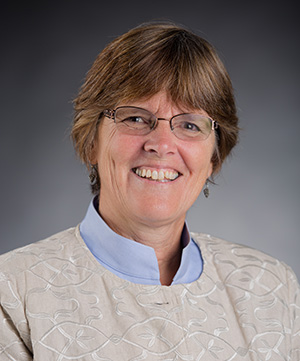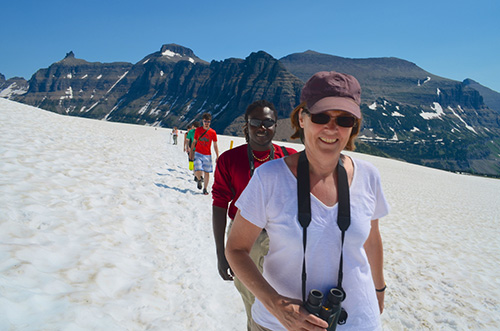WSU Welcomes New College of Science Dean
OGDEN, Utah – The new dean of Weber State University’s College of Science reintroduced beavers to a Russian nature preserve, snare-trapped grizzly bears for research in Montana, and spent her most recent nine years at St. George’s University in Grenada.
“My career has been very rewarding; I’ve done research all over the world, and I’ve worked with great faculty and administration at several universities,” said Andrea Easter-Pilcher. “It’s been inspirational and exciting, and I really look forward to continuing that at Weber State University.”

Andrea Easter-Pilcher
Easter-Pilcher was hired at St. George’s as chair of what is now called the Department of Biology, Ecology and Conservation to grow the general biology, wildlife, and marine biology programs. Under her leadership, the department grew to be the largest department in the School of Arts and Sciences. She spent the last five years at the university in the positions of associate, senior associate, interim dean, and dean of the School of Arts and Sciences.
Colleagues at St. George’s University have noted that Easter-Pilcher was not just popular at the university, but with people throughout the small island nation of Grenada.
“According to one of her many references, Dr. Easter-Pilcher is known for being friendly, kind (but not a push-over) and exceptionally good at problem-solving,” said Madonne Miner, WSU provost. “That is precisely the kind of leader we look for at Weber State.”
Childhood in Montana
As a child, Easter-Pilcher spent summers living with her family in a hand-hewn log cabin with few modern amenities on a lake near the Bob Marshall Wilderness Area in western Montana.
“Being part of that high-mountain landscape throughout my childhood and into my adulthood is a big piece of my story,” Easter-Pilcher explained. “We were outside in the wild lands of Montana all the time, and I grew up getting more and more passionate about wildlife biology and conservation.”
Easter-Pilcher earned her Ph.D. in the biological sciences at Montana State University, her master’s degree in wildlife biology at the University of Montana and her bachelor’s degree in cultural anthropology at Bowdoin College in Maine.
%20copy.jpg)
1986, photographer Douglas Chadwick, courtesy of National Geographic
She said she learned the benefits of taking risks and seeking opportunities early in her career.
“In Montana, when I was growing up, grizzly bear research was in the news because of Drs. John and Frank Craighead and their pioneering work with grizzly bears in Yellowstone National Park,” Easter-Pilcher remembers. “By the time that I was considering graduate education, I knew that I wanted to work with grizzly bears, so I wrote a letter to the head of the Great Bear Foundation who was also a faculty member at the University of Montana, Dr. Charles Jonkel. He took me on and taught me so much of what he knew about bears, their biology and how to trap them, and it was great fun. I led a bear-trapping team through two seasons for both black and grizzly bears.”
She learned two things through those early experiences: First, ensure a snared bear is fully secured before approaching, and second, it’s important to ask for what you want in life.
Research grants
Easter-Pilcher employed that lesson successfully throughout her career. She has asked for and received more than a dozen grants for various wildlife conservation research projects. Her first major grant came as a post-doctoral research scientist at Purdue University. That money was used to assess damage from white-tailed deer to the vegetation in the state parks in Indiana. Another grant from the Charles A. and Anne Morrow Lindbergh Foundation was used to help restore a wetland in the Volga-Kama National Nature Preserve in Tatarstan, Russia, by reintroducing beavers.
In 2014, Dr. Easter-Pilcher and five international colleagues were awarded grant money from the United States Fish and Wildlife Service to develop a program to train emerging young leaders in conservation in the Caribbean and Latin America — a program that continues to grow and flourish today.
Delegate to International Trade in Endangered Species convention
While working as a faculty member, chair and dean at St. George’s, Easter-Pilcher and her students studied endangered and endemic island birds. Twice she was invited to represent the country of Grenada as an official delegate to the Convention on International Trade in Endangered Species of Wild Fauna and Flora (CITES): first in Bangkok, Thailand, and then Johannesburg, South Africa.
“Delegates spend 12 days going over all of the species that have been petitioned to be listed for protection under the CITES convention or treaty,” Easter-Pilcher said. “It was a culminating experience for a wildlife and conservation biologist like myself to sit at the Grenada table advising the Grenada delegates on the vulnerability of each species in terms of their population ecology, the rate of decline and whether the species needs to be protected immediately and at what level. This was so exciting for me and incredibly rewarding.”

Easter-Pilcher in Glacier National Park with SGU Student Wayne Smart
Easter-Pilcher said what surprises her when teaching lower-division conservation biology is how little students know about the realities of the decline of ecosystems and species across the globe.
“What I would really like students to understand is that when we lose these species and ecosystems, we’re not just losing them for our generation, but for future generations, but it doesn’t have to be that way,” she said. “We can make choices that are sustainable for species and ecosystems and for humans as well, and that’s the positive spin. We don’t have to continue going this direction.”
Innovative course schedule
Easter-Pilcher’s largest grant request, written in collaboration with a colleague, was awarded to plan, study and potentially implement a radical schedule change in the courses offered at the University of Montana—Western.
The entire university shifted from a traditional schedule to one where students take just one class at a time, which is condensed into three and a half weeks, including lectures, projects and fieldwork. Ten years later, enrollments and graduation rates at the university continue to climb.
Easter-Pilcher said she enjoys facilitating collaborative change that improves education and outcomes for students across all disciplines. In her new role as dean of the College of Science at Weber State University, she plans to facilitate collaborative efforts that will improve enrollment, retention and time to graduation for all students across the sciences.
Easter-Pilcher and her husband returned from Grenada in June. She will assume her responsibilities as WSU College of Science dean on Aug. 1.
For high-resolution photos, visit the following links.
Visit weber.edu/wsutoday for more news about Weber State University.
Allison Barlow Hess, public relations director
801-626-7948 • ahess@weber.edu- Contact:
Allison Barlow Hess, public relations director
801-626-7948 • ahess@weber.edu